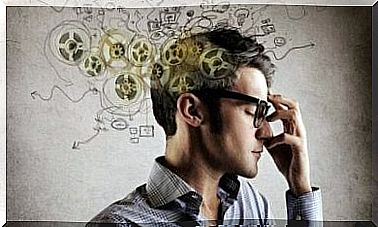What Are Mood Swings And How Do They Affect You?

If there is one thing that is true about emotions, it is that they are universal… But every culture has its differences. A smile can mean something different than we think, and a wrinkled forehead can convey something other than our words. But beyond what people express and recognize, depending on what country and culture we look at, our overall emotions are the same. But when our emotional states are out of control, we look at mood swings.
The ability to identify what is happening to the person in front of you makes you comfortable and reduces your insecurity. When you meet someone who is upset, you identify it, understand it, and may even begin to feel empathy. This means you are familiar with the territory and you generally know how to react in a more or less appropriate way. So what happens when you meet someone who shows signs of uncontrolled emotions?
“Love your own feelings and never underestimate them.”
-Robert Henri-
They are not “bipolar”, they have mood swings
Now is a good time to clarify something about what the awful phrase “they are bipolar” means. We often hear one person describe another as “bipolar” just because they do not understand how the other person’s mood can change so quickly. Bipolar is a serious mental illness, also known as manic depressive disorder.

According to physician Fred K. Berger (2016), these phases can last days or months. There is a psychiatric diagnosis and specific treatment for such problems . So what we happen to refer to as bipolar is actually much closer to a mood swing.
“When dealing with humans, let us remember that we are not dealing with creatures of logic. We are dealing with creatures of emotion. “
–Dale Carnegie–
Mood swings are not exactly considered a mental problem or an illness. So what are they and what do they refer to? They are pretty much emotions that are out of control . There is a feeling of lack of regulation in a person’s emotions and expressions of basic emotions.
People who exhibit these episodes of sadness and happiness, for example, have moments of uncontrolled crying or inappropriate laughter. It is a symptom associated with certain conditions, such as autism or schizophrenia. But apparently healthy people also suffer from this.
Illness or complicated affective moment?
Mood swings belong to the “spectrum of affective problems.” Affectivity is the group of reactions a person feels and expresses towards internal factors (thoughts, etc.) or external (work, family, social situations, etc.). What is the cause of these changes in mood or state of mind? Is it biology or is there a thought pattern behind it?
We have traditionally known that emotional regulation and control takes place in the limbic system. This is part of our brain structure . There is a physical part of our brain that exists to express, regulate and control our emotions.
“We are dangerous when we are not aware of our responsibility for how we behave, think and feel.”
– Marshall B. Rosenberg –

There is a right element to all of this that can ruin, change or stop functioning properly without us being able to do anything about it. Brain damage is the main cause of excessive mood swings and it is absolutely limiting.
We usually see such problems in people who have MS, ALS, cardiovascular problems, Parkinson’s or Alzheimer’s. In a complicated affective moment, we have a hard time regulating emotions and expressions that belong to the same group as grief. But do not confuse it with depression, for there are traits of depression (like appetite) that are not affected by mood swings.
So what are mood swings and what are not?
Mood swings surprise anyone who witnesses them. Exaggerating an otherwise neutral comment, laughing or crying uncontrollably in an undramatic situation is a warning sign.
We probably know someone who is in the middle of or has been through a traumatic divorce. They may have moments of relief during the week where they seem sad and cry. They can have other relaxed moments at a dinner party with friends or watch a TV show. That does not mean they have mood swings.
We also know that we can somehow influence people’s emotional regulation. There are studies and reviews conducted by universities that officially prove this (R. Company, U. Colonel, and F. Sánchez, Psychology Bulletin, No. 104, 2012). In the case of mood swings, the margin of action for the surrounding people is very limited, if not completely non-existent.

“Emotions can get in the way or get you on the road.”
-Mavis Mazhura-
Having mood swings is not a disorder. It’s just a temporary state of lack of control. In addition to the severe cases, the person involved usually has stable moments in between . This affective problem can have really important consequences on a social and work level.
The person may experience isolation, depression or anxiety problems. If you experience these feelings, see a doctor so they can perform an evaluation, refer to a specialist or, if necessary, determine the treatment.









